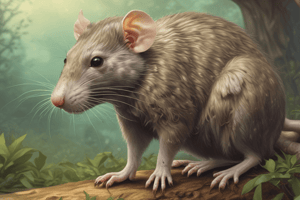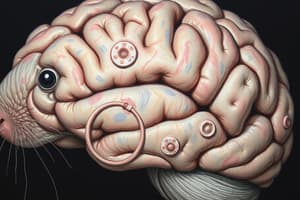Podcast
Questions and Answers
What is the scientific name of the rat?
What is the scientific name of the rat?
Rattus norvegicus
What family does the rat belong in?
What family does the rat belong in?
Muridae
When did the rat reach North America?
When did the rat reach North America?
1775
What is the scientific Classification- Domain of the rat?
What is the scientific Classification- Domain of the rat?
Signup and view all the answers
What is the scientific Classification- Kingdom of the rat?
What is the scientific Classification- Kingdom of the rat?
Signup and view all the answers
What is the scientific Classification- Phylum of the rat?
What is the scientific Classification- Phylum of the rat?
Signup and view all the answers
What is the scientific Classification- Class of the rat?
What is the scientific Classification- Class of the rat?
Signup and view all the answers
What is the scientific Classification- Genus of the rat?
What is the scientific Classification- Genus of the rat?
Signup and view all the answers
What is the scientific Classification- Family of the rat?
What is the scientific Classification- Family of the rat?
Signup and view all the answers
How many different species are in the scientific Classification- Species of the rat?
How many different species are in the scientific Classification- Species of the rat?
Signup and view all the answers
What does cranial/anterior refer to in rats?
What does cranial/anterior refer to in rats?
Signup and view all the answers
What does caudal/posterior refer to in rats?
What does caudal/posterior refer to in rats?
Signup and view all the answers
What does dorsal mean?
What does dorsal mean?
Signup and view all the answers
What does ventral mean?
What does ventral mean?
Signup and view all the answers
What does lateral refer to?
What does lateral refer to?
Signup and view all the answers
What does medial refer to?
What does medial refer to?
Signup and view all the answers
What are incisors?
What are incisors?
Signup and view all the answers
What is the function of the pinna?
What is the function of the pinna?
Signup and view all the answers
What are eyelids?
What are eyelids?
Signup and view all the answers
What is the nictitating membrane?
What is the nictitating membrane?
Signup and view all the answers
What are vibrissae?
What are vibrissae?
Signup and view all the answers
What are nares?
What are nares?
Signup and view all the answers
What is the anus?
What is the anus?
Signup and view all the answers
What are mammary papillae? (females only)
What are mammary papillae? (females only)
Signup and view all the answers
What does caudal refer to?
What does caudal refer to?
Signup and view all the answers
What does pectoral refer to?
What does pectoral refer to?
Signup and view all the answers
What does pelvic refer to?
What does pelvic refer to?
Signup and view all the answers
What does dermal refer to?
What does dermal refer to?
Signup and view all the answers
What does longitudinal refer to?
What does longitudinal refer to?
Signup and view all the answers
What is the abdominal cavity?
What is the abdominal cavity?
Signup and view all the answers
What is the thoracic cavity?
What is the thoracic cavity?
Signup and view all the answers
What is the buccal cavity?
What is the buccal cavity?
Signup and view all the answers
What is the passage that extends from the base of the skull to about the sixth cervical vertebra?
What is the passage that extends from the base of the skull to about the sixth cervical vertebra?
Signup and view all the answers
The pharynx receives air from the?
The pharynx receives air from the?
Signup and view all the answers
Air, food, and water come from the?
Air, food, and water come from the?
Signup and view all the answers
The nasal cavity, oral cavity, and pharynx open into the?
The nasal cavity, oral cavity, and pharynx open into the?
Signup and view all the answers
What is ventilation?
What is ventilation?
Signup and view all the answers
What are the mouth and nostril?
What are the mouth and nostril?
Signup and view all the answers
What is the larynx?
What is the larynx?
Signup and view all the answers
What is the trachea?
What is the trachea?
Signup and view all the answers
What is the bronchus?
What is the bronchus?
Signup and view all the answers
What are lungs?
What are lungs?
Signup and view all the answers
What is the diaphragm?
What is the diaphragm?
Signup and view all the answers
How does blood flow through your lungs?
How does blood flow through your lungs?
Signup and view all the answers
What is the heart?
What is the heart?
Signup and view all the answers
What is the pericardium?
What is the pericardium?
Signup and view all the answers
What is the vena cava?
What is the vena cava?
Signup and view all the answers
What is the aorta?
What is the aorta?
Signup and view all the answers
What are the left atrium and ventricle?
What are the left atrium and ventricle?
Signup and view all the answers
What is a vein?
What is a vein?
Signup and view all the answers
What is an artery?
What is an artery?
Signup and view all the answers
What is the cerebellum?
What is the cerebellum?
Signup and view all the answers
What is the frontal lobe of the cerebrum?
What is the frontal lobe of the cerebrum?
Signup and view all the answers
Study Notes
Scientific Classification
- Scientific name of the rat: Rattus norvegicus
- Family: Muridae
- Domain: Eukarya
- Kingdom: Animalia
- Phylum: Chordata
- Class: Mammalia
- Genus: Rattus
- Total species: 64 different species within the genus
Rat History and Geography
- Rats reached North America in the year 1775
Anatomical Terms
- Cranial/Anterior: Near the head, above the abdomen
- Caudal/Posterior: Near the tail, below the abdomen
- Dorsal: Along the back of the animal
- Ventral: Along the belly of the animal
- Lateral: Length of the animal
- Medial: From the chest to the pelvic area
Physical Features
- Incisors: Large protruding front teeth
- Pinna: Large part of the ears that directs sound to the canal
- Eyelids: Cover and protect the eyes
- Nictitating membrane: Extra eye covering for protection
- Vibrissae: Whiskers that provide a sense of touch
- Nares: Nostrils for breathing
- Anus: Exit point for waste from the body
- Mammary papilla (females only): Structures for feeding their young
Body Cavities
- Abdominal cavity: Area below the ribcage
- Thoracic cavity: Area above the ribcage
- Buccal cavity: Involved in eating and drinking
Respiratory System
- Pharynx: Passway from the base of the skull to about the sixth cervical vertebra; serves respiratory and digestive systems
- Nasal cavity: Source of air for the pharynx
- Oral cavity: Intake for food, water, and air
- Larynx: Produces sound for communication
- Trachea: Tube that carries air to the lungs
- Bronchus: Branches into the lungs
- Lungs: Exchange oxygen from air into blood and expel carbon dioxide
- Diaphragm: Muscle that aids in filling the lungs with air
Circulatory System
- Blood flow through lungs is known as pulmonary circulation
- Heart: Main organ that pumps blood throughout the body
- Pericardium: Protective layer around the heart
- Vena cava: Returns used blood to the right atrium
- Aorta: Main artery that carries oxygenated blood out of the left ventricle
- Left atrium and ventricle: Chambers responsible for pumping blood to the lungs
- Veins: Carry used blood back to the heart
- Arteries: Carry oxygen-rich blood away from the heart (particularly pulmonary arteries)
Brain Anatomy
- Cerebellum: Regulates movement, muscle coordination, and balance
- Frontal lobe of the cerebrum: Responsible for reasoning, emotions, judgment, and voluntary movement
Studying That Suits You
Use AI to generate personalized quizzes and flashcards to suit your learning preferences.
Description
This quiz covers essential facts about rats, including their scientific classification and historical spread to North America. Test your knowledge on the scientific name, family classification, and taxonomic hierarchy of rats. Perfect for science enthusiasts or students studying zoology.




